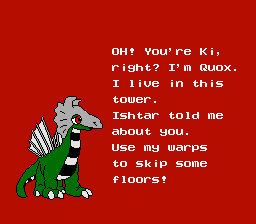
in this picture, what is q.t. saying? this:
so. one sentence at a time.
one

you know! the thing! from the game!
| suatł pattalal šilbari gulaigúšḿ fulla | ||||
| [ˌsuətɫ̩ ˈpatːɐləlʲ ˈʃilʲbɐɾɪ ɡɔˈlaɪɣɔːʃm̩ fʊɫːɑ] | ||||
| sua–t–ł | patta–la–l | šil–ba–ri | gulai–gúš–ḿ | fulla |
| 2–GEN–PL | door–INS–PL | floor–SUP–PRL | jump–2p | can |
| use your warps to skip some floors | ||||

out of context, patta means door. i suppose a portal would be a magic door, an ustaitł patta. but in the context of someone making one right in front of you, it is clear what kind of door we’re talking about.

- the suffix pair –bari together mean “over”. there was something like this last time too. since it is how the language expresses all spatial and temporal relationships, that’s not very surprising.
two
| sá sá panísat igitḿ ǧunailam lám ušmináša nat lánášḿ fulla | ||||||||
| [saːsɐ pɐˈniːsɐt ˈiʝɛtm̩ dʒuˈnaɪlɐ̃ ˌlãːm‿ʊʃmiˈnaːʃə ˌnat ˈlaːnaːʃm̩ ˌfʊɫːə] | ||||||||
| sá sá | panísa–t | igi(s)–t–ḿ | ǧunai–la–m | lá–m | ušmi–náš–(j)a | na(i)–t | lá–náš–ḿ | fulla |
| now | blue–GEN | crystal–GEN–DEF | rod–INS–DEF | do–DEF | want–1p–REL | one–GEN | do–1p–DEF | can |
| these days we can use the blue crystal rod for whatever we want | ||||||||

babylon no longer exists, so it doesn’t need protecting. go have fun
one sá means “right at this moment”. two sá sá means “these days”. the second one is actually pronounced with a short vowel.
igis also means “ice”. “crystal” more explicitly can be kut igis, or “stone ice”.
nai means both “one” and “anything”. phrased more literally, lám ušmináša nat is “anything that we want to do”.
the way auxiliary verbs like “can” work is a little strange. let’s take a shorter sentence, šanil gubam fulla, “flowers can grow”. first you take the base sentence, šanil guba “flowers grow”, and add m, which when it’s not part of a grammatical template, means “the”, but makes the clause into a noun phrase. then that is used as the subject of the verb fulla, or bulla “must”, etc. so more literally, these auxiliaries mean something like “is possible/necessary”. “{flowers grow here} is possible”.
three
| ǧisat fuhat siham iksaháš | |||
| [ˈdʒisɐt ˌfuxɑt ˈsixɑ̃m‿ˌiksɐxɑːʃ] | |||
| ǧisa–t | fuha–t | siha–m | iksa–háš |
| fire–GEN | breath–GEN | remember–DEF | IMP–2p |
| be careful with the fire breath | |||

- iksa has the same grammatical structure as fulla above. it makes a sentence into a request. it has one special feature: since in the vast majority of cases, it only makes sense for both iksa and the main verb to be second person, when that is the case, only iksa needs to have the person marking. otherwise it would be sihaham above.
abbreviation list
- DEF
- definite “the”
- GEN
- genitive “of”
- INS
- instrumental “using”
- PL
- plural
- PRL
- perlative “through”
- REL
- relative clause suffix “which/that”
- SUP
- superessive “above”


